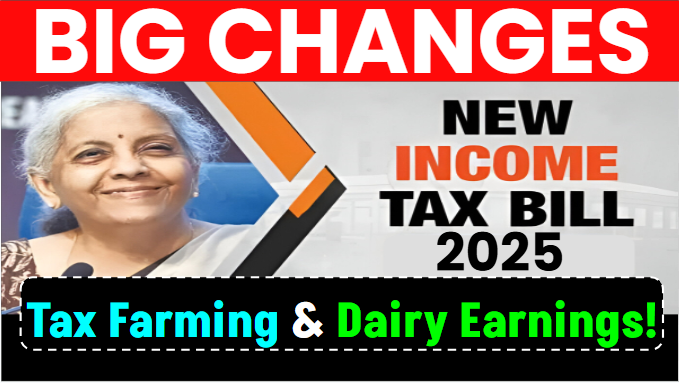
The Income Tax Bill 2025 is set to bring significant changes to India’s taxation system, aiming to simplify tax laws and reduce litigation. A crucial aspect of the bill is its approach to agricultural income, including earnings from farming and dairy activities. While traditional agricultural income remains tax-exempt, the bill introduces new measures to monitor and regulate agricultural earnings, ensuring fair taxation and preventing misuse of exemptions.
Big Change: Income Tax Bill 2025
| Feature | Details |
|---|---|
| Agricultural Income | Traditional farming and dairy farming remain tax-exempt. |
| Non-Agricultural Activities | Income from poultry, fisheries, and beekeeping is now taxable. |
| Enhanced Monitoring | High-value agricultural transactions will be scrutinized to prevent tax evasion. |
| Objective | Simplify tax laws, reduce disputes, and promote compliance. |
| Implementation | Expected to be enforced starting April 1, 2025. |
| Official Source | Income Tax Department of India |
The Income Tax Bill 2025 introduces significant clarifications on what qualifies as tax-free agricultural income while closing loopholes that allowed tax evasion. Traditional farming and dairy farming remain exempt, but poultry, fisheries, and agri-processing businesses will be taxed. With enhanced monitoring and compliance measures, the bill ensures only genuine farmers benefit from tax exemptions, reducing fraud and improving revenue collection.
Also Check: BOB Minimum Balance Rule: Know Bank of Baroda’s Minimum Balance Rules Before Opening an Account!
Big Change: Income Tax Bill 2025 Understanding Agricultural Income Under the New Tax Bill
Agricultural income in India has traditionally been exempt from income tax under Section 10(1) of the Income Tax Act, 1961. The Income Tax Bill 2025 retains this exemption but clarifies and tightens the definition of what qualifies as agricultural income.
What Remains Tax-Free?
Income from the following agricultural activities will continue to be exempt from taxation:
- Growing and harvesting crops (e.g., wheat, rice, vegetables, fruits).
- Dairy farming, including selling milk and related products.
- Plantation farming (e.g., tea, coffee, rubber, spices).
- Sale of produce directly from farms without additional processing.
- Income from leasing agricultural land for farming purposes.
This reinforces the government’s support for the agricultural sector, which employs nearly 42% of India’s workforce and contributes significantly to GDP.
What Will Now Be Taxed?
The new bill clearly differentiates agricultural income from non-agricultural activities. The following income sources will be taxable under the new rules:
- Poultry farming
- Beekeeping and honey production
- Fisheries and aquaculture
- Horticulture and floriculture (beyond basic cultivation)
- Agri-based businesses (e.g., food processing, agro-industries)
- Income from sale of processed farm goods (e.g., packaged vegetables, dairy products beyond raw milk)
This change aims to prevent tax evasion where businesses falsely classify their income as agricultural to avoid taxation.
Also Check: DA Hike: Salary of 10 Lakh Govt Employees Gets a Boost! Dearness Allowance increased by 4%
Big Change: Income Tax Bill 2025 Why This Change? Addressing Tax Evasion
In recent years, misuse of agricultural income exemptions has been a growing concern. Several high-income individuals and corporations have reported large agricultural earnings to avoid paying taxes.
Case in Point: Unusual Growth in Agricultural Income
According to the Income Tax Department, the reported agricultural income in India increased from ₹1.2 lakh crore in 2011 to ₹2.8 lakh crore in 2020. However, the actual growth in farming productivity did not justify this sharp rise. This raised suspicions of tax evasion, prompting the government to tighten regulations.
New Compliance Measures in the Bill
To ensure only genuine agricultural income remains tax-free, the following monitoring mechanisms have been introduced:
- Mandatory PAN Linking: Farmers earning above ₹10 lakh per year must link their PAN card with their agricultural income declaration.
- High-Value Transaction Monitoring: Land sales above ₹50 lakh will be reported to tax authorities.
- Detailed Documentation: Large farm owners must provide proof of agricultural activity through bills, invoices, and land records.
- Audits for Large Farmers: Farmers earning more than ₹1 crore annually will be subject to random audits.
These steps ensure transparency and fairness, preventing wealthy individuals from using agriculture as a tax loophole.
Big Change: Income Tax Bill 2025 Impact on Farmers and the Dairy Industry
The Income Tax Bill 2025 aims to protect small farmers while ensuring that agri-businesses contribute fairly to the tax system.
For Small and Medium Farmers
- No tax impact for most farmers, as traditional agriculture remains exempt.
- Easier compliance for those with simple income structures.
- Better protection against fraudulent agricultural income claims, which may have previously caused policy distortions.
For Large Farmers and Agribusinesses
- Agri-based businesses need to restructure their tax planning.
- Poultry, fisheries, and dairy businesses will need to comply with regular income tax regulations.
- Farmers with large-scale commercial production will now have clearer tax guidelines.
Also Check: RBI FD Rules: Check RBI New FD Guidelines, Big Boost for Fixed Deposit Holders
Big Change: Income Tax Bill 2025 (FAQs)
Will my income from selling milk be taxed?
No. Basic dairy farming, such as selling raw milk, remains tax-free. However, if you process the milk into cheese, butter, or packaged dairy products, you will need to pay income tax on those earnings.
Do I need to file tax returns if I only earn from crop farming?
No. If your earnings come solely from crop cultivation, you are not required to file an income tax return for that income. However, if your total income exceeds ₹2.5 lakh (including non-agricultural income), you may need to file a return.
How will the government track agricultural income?
The government will monitor large transactions, require PAN details, and conduct audits for high-income farmers to prevent tax evasion.
What if I own land but lease it to another farmer?
Rent received from leasing agricultural land is not taxable, provided it is used for agricultural purposes.
Will poultry farming be taxed now?
Yes. Poultry farming is no longer considered agricultural income and will be subject to regular income tax.









